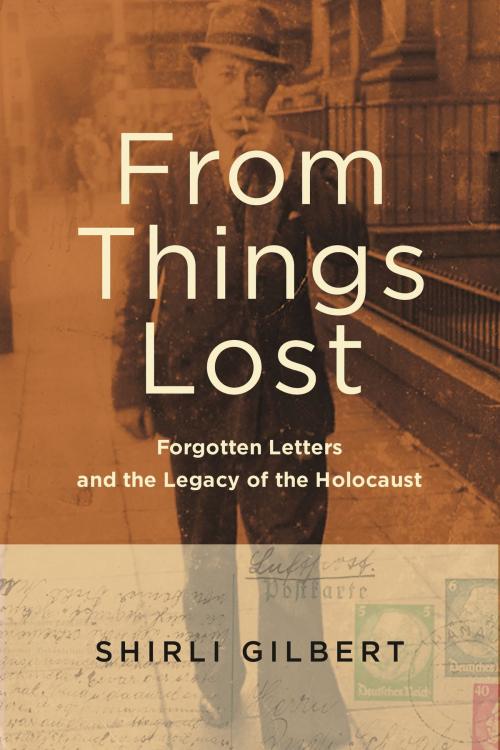From Things Lost
Forgotten Letters and the Legacy of the Holocaust
Nonfiction, History, Jewish, Holocaust, Modern, 20th Century| Author: | Shirli Gilbert | ISBN: | 9780814342664 |
| Publisher: | Wayne State University Press | Publication: | May 15, 2017 |
| Imprint: | Wayne State University Press | Language: | English |
| Author: | Shirli Gilbert |
| ISBN: | 9780814342664 |
| Publisher: | Wayne State University Press |
| Publication: | May 15, 2017 |
| Imprint: | Wayne State University Press |
| Language: | English |
In May 1933, a young man named Rudolf Schwab fled Nazi-occupied Germany. His departure allegedly came at the insistence of a close friend who later joined the Party. Schwab eventually arrived in South Africa, one of the few countries left where Jews could seek refuge, and years later, resumed a relationship in letters with the Nazi who in many ways saved his life. From Things Lost: Forgotten Letters and the Legacy of the Holocaust is a story of displacement, survival, and an unlikely friendship in the wake of the Holocaust via an extraordinary collection of letters discovered in a forgotten trunk. Only a handful of extended Schwab family members were alive in the war’s aftermath. Dispersed across five continents, their lives mirrored those of countless refugees who landed in the most unlikely places. Over years in exile, a web of communication became an alternative world for these refugees, a place where they could remember what they had lost and rebuild their identities anew. Among the cast of characters that historian Shirli Gilbert came to know through the letters, one name that appeared again and again was Karl Kipfer. He was someone with whom Rudolf clearly got on exceedingly well—there was lots of joking, familiarity, and sentimental reminiscing. “That was Grandpa’s best friend growing up,” Rudolf’s grandson explained to Gilbert; “He was a Nazi and was the one who encouraged Rudolf to leave Germany. . . . He also later helped him to recover the family’s property.” Gilbert takes readers on a journey through a family’s personal history wherein we learn about a cynical Karl who attempts to make amends for his “undemocratic past,” and a version of Rudolf who spends hours aloof at his Johannesburg writing desk, dressed in his Sunday finest, holding together the fragile threads of his existence. The Schwab family’s story brings us closer to grasping the complex choices and motivations that—even in extreme situations, or perhaps because of them—make us human. In a world of devastation, the letters in From Things Lost act as a surrogate for the gravestones that did not exist and funerals that were never held. Readers of personal accounts of the Holocaust will be swept away by this intimate story.
In May 1933, a young man named Rudolf Schwab fled Nazi-occupied Germany. His departure allegedly came at the insistence of a close friend who later joined the Party. Schwab eventually arrived in South Africa, one of the few countries left where Jews could seek refuge, and years later, resumed a relationship in letters with the Nazi who in many ways saved his life. From Things Lost: Forgotten Letters and the Legacy of the Holocaust is a story of displacement, survival, and an unlikely friendship in the wake of the Holocaust via an extraordinary collection of letters discovered in a forgotten trunk. Only a handful of extended Schwab family members were alive in the war’s aftermath. Dispersed across five continents, their lives mirrored those of countless refugees who landed in the most unlikely places. Over years in exile, a web of communication became an alternative world for these refugees, a place where they could remember what they had lost and rebuild their identities anew. Among the cast of characters that historian Shirli Gilbert came to know through the letters, one name that appeared again and again was Karl Kipfer. He was someone with whom Rudolf clearly got on exceedingly well—there was lots of joking, familiarity, and sentimental reminiscing. “That was Grandpa’s best friend growing up,” Rudolf’s grandson explained to Gilbert; “He was a Nazi and was the one who encouraged Rudolf to leave Germany. . . . He also later helped him to recover the family’s property.” Gilbert takes readers on a journey through a family’s personal history wherein we learn about a cynical Karl who attempts to make amends for his “undemocratic past,” and a version of Rudolf who spends hours aloof at his Johannesburg writing desk, dressed in his Sunday finest, holding together the fragile threads of his existence. The Schwab family’s story brings us closer to grasping the complex choices and motivations that—even in extreme situations, or perhaps because of them—make us human. In a world of devastation, the letters in From Things Lost act as a surrogate for the gravestones that did not exist and funerals that were never held. Readers of personal accounts of the Holocaust will be swept away by this intimate story.















